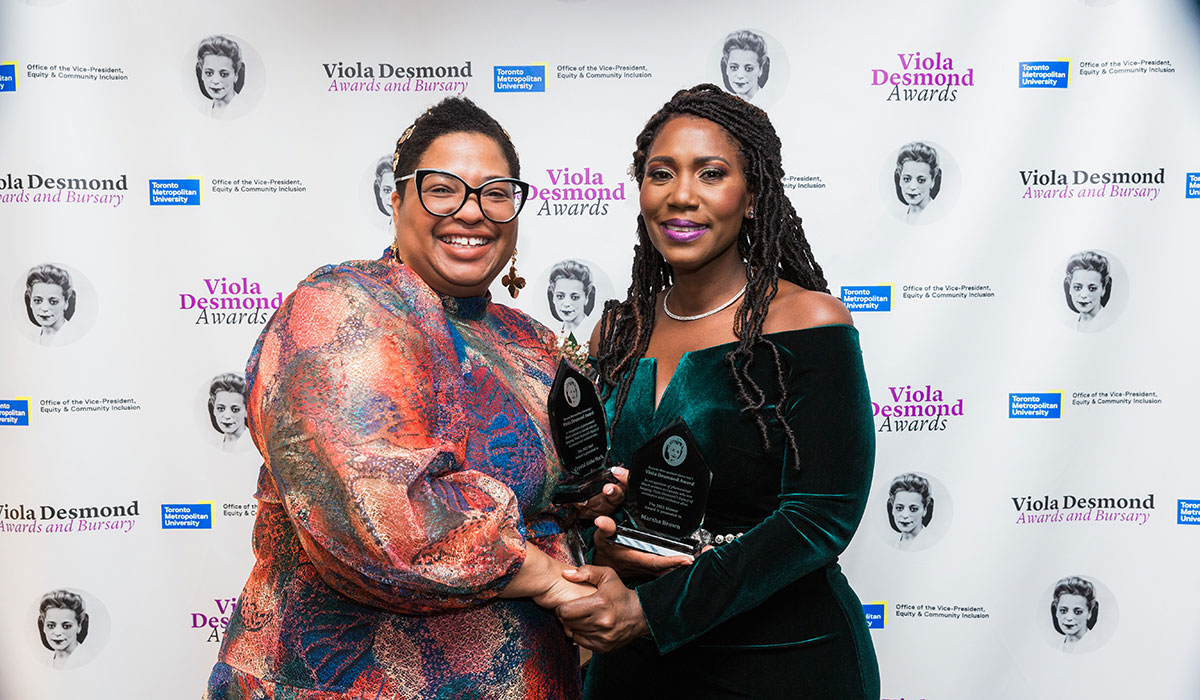Office of the Vice-President, Equity and Community Inclusion recommendation
While meaningful institutional change requires whole-university approaches and participation, it also requires an intentional and ongoing effort responsive to a continually evolving world and informed by lived experience, good practice and subject matter expertise.

Marcelle Mullings speaking at OVPECI’s Soup and Substance panel (2023).

The university should engage in a campaign that clarifies the mandate of OVPECI and the work it is intended to do on campus, distinguishing it from other units, specifically the Human Resources unit.

Crystal Mark and Marsha Brown at the Viola Desmond Awards (2023).
The OVPECI works to create an enabling and supportive environment for transformational change at the university. From consulting across teams and enhancing accountability to providing expertise, reviewing policies, delivering training, organizing events and offering critical resources, the OVPECI has collaborated with cross-campus partners to support the implementation of every recommendation included in the Climate Review.
The OVPECI’s publication of the Climate Review in 2020 represented one milestone alongside a decorated history of the office’s work in championing equity and community inclusion. The OVPECI was initially formed in response to an examination of systemic racism at TMU conducted by the University’s Taskforce on Anti-Racism in 2010. The study, which reported on the prevalence of systemic racism and structural barriers at the institution, culminated in a recommendation to create an office dedicated to promoting EDI at the university. As such, community-activated commitment to equity lies at the core of the OVPECI’s fabric, uniquely positioned to house the implementation of the Climate Review recommendations and support teams across the university in fostering an equitable and intentionally inclusive campus.
What has changed?
Since the launch of the Climate Review, the OVPECI has consulted and collaborated with cross-campus partners to support the implementation of all 14 recommendations. The OVPECI has introduced, sustained and expanded a range of cross-cutting measures to drive the university’s work to confront anti-Black racism across five areas of work:
- partnerships and collaboration
- education and awareness
- public engagement and communications
- research and policy and
- governance and leadership
What’s next?
With Tanya De Mello assuming the Vice-President, Equity and Community Inclusion role on January 1, 2023, the OVPECI has developed and initiated a strategy to implement and articulate progress on recommendation 14.
Planning will begin with the development of a university-wide EDI strategic plan that will provide a roadmap for the university’s strategic direction in terms of EDI and refine OVPECI's mandate and jurisdiction. The OVPECI has initiated the preliminary stages of developing a university-wide EDI strategic plan through a listening tour with senior administrators and leaders on campus.

Suzette Vidale playing steel pan at the Viola Desmond Awards (2023).

Essential nutrients
Essential nutrients refer to supplementary initiatives that have emerged outside of the direction of the PICCABR to cultivate the conditions for Black flourishing. While there may be some overlap, these essential nutrients have been organically planted by various students, faculty and staff groups across the university.
The Special Advisor to the President on Equity, Diversity, Inclusion and Decolonization (EDID) Curriculum Transformation has been discussing with faculty, staff and students to encourage course content building informed by practices of equity, anti-racism and decolonization across degree requirements. The Special Advisor EDID serves as a liaison to support faculty in discussions that guide the curriculum transformation strategy, helping to enable them to make decisions regarding the creation of mandatory equity content across disciplines in a systemic and long-lasting way.
In 2022, the Research, Planning and Assessment unit in the OVPECI expanded the scope of the university’s equity-deserving groups. Where TMU previously recognized five equity-deserving groups, including Indigenous Peoples, racialized peoples, persons with disabilities, 2SLGBTQ+ peoples and women, the university has now added Black peoples as a distinct group. In other words, university reports and the data available online will now explicitly include disaggregated data on Black students, faculty and staff.
Human Rights Services provides individual and group training on anti-Black racism to resolve complaints received under the Discrimination and Harassment Prevention Policy.
Several networks, committees and groups have existed or recently emerged across the university to bring Black stakeholders together around shared experience and goals:
- The Black Faculty and Staff Community Network brings Black faculty and staff together to celebrate Black excellence in all its many forms at TMU. It remains committed to fostering a community of mutual support at the university and offers opportunities for personal and professional development, mentorship and social engagement.
- The Black Excellence Committee organizes events and creates opportunities for Black students, faculty and staff to authentically share space throughout the year. The committee is a collaboration between OVPECI, the Tri-Mentoring Program led by the OVPS, the Talent Management Centre of Expertise in Human Resources and Magnet.
- The TRSM Anti-Black Racism Awareness Committee established four working subcommittees focusing on community engagement and awareness, audit and evaluation, education and training, scholarship, and bursary.
- The TMU Belong Committee is a group of student-athletes, coaches, staff and external stakeholders within Athletics and Recreation, providing counsel and guidance to support strategy and operations from an EDI lens. They also work to create alternative pathways for community members to raise concerns and issues.
The employee and student Diversity Self-ID programs, led by the Research, Planning and Assessment unit of the OVPECI, collect, analyze and report self-identification data at the university. They enable the community to identify patterns and trends to know where progress is being made and where the university is falling short of attracting and retaining talent in the broader community.
The program involves the collection, analysis and reporting of data on the representation, recruitment and retention of students, faculty and staff from TMU’s six equity-deserving groups, including First Nations, Métis and Inuit Peoples, Black people, persons with disabilities, racialized people, 2SLGBTQ+ people and women.
The addition of Black people as a distinct equity-deserving group recognized by the university was made in 2022. Now, all reports, presentations and tools that include Diversity Self-ID data include data explicitly on the experiences of Black students, faculty and staff at TMU.
Together with other information, the data is used as a tool across teams to make informed decisions that respond to issues of representation, inclusion and accessibility. In addition to the publicly available data, reports and expert advice on using data are provided to leaders and teams across the campus to inform plans and decision making and measure progress.
Making data available makes visible issues impacting community members from equity groups at TMU. The Diversity Self-ID programs help enable positive change at the university and beyond.
Previous section:
Faculty recommendations